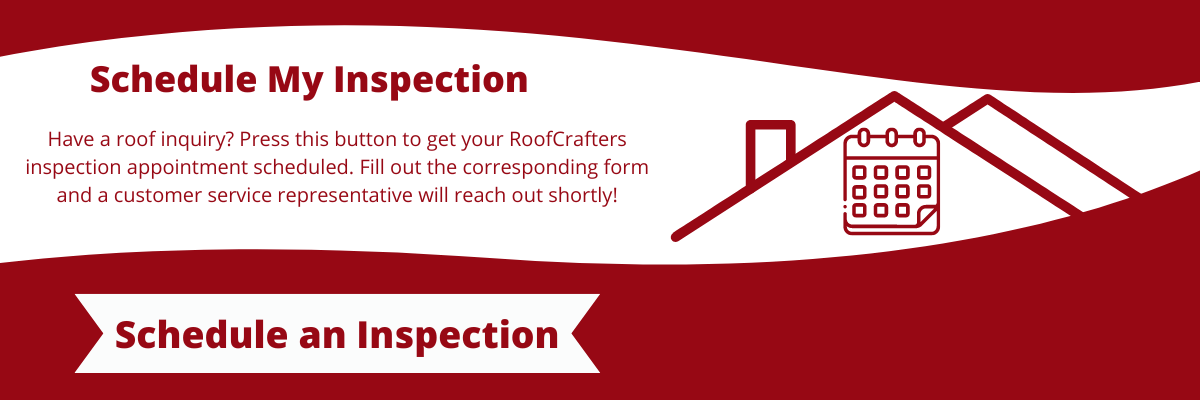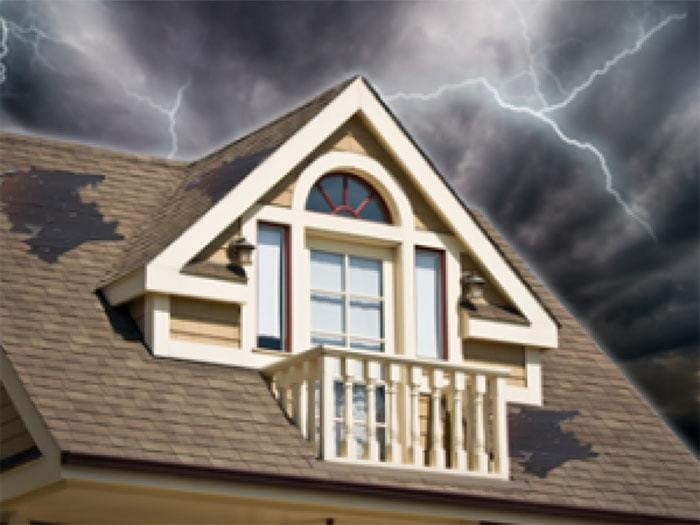
Thunderstorms in Jacksonville, FL are both awe-inspiring and terrifying, right? The pounding rain and the electrifying flashes of lightning can be quite the spectacle, until... drip, drip, drip. Uh-oh, water is now turning your living room into a makeshift lake, and you're sending the kids on a mad dash for every available pot and pan!
You're not in a scene from a disaster movie, but it sure feels like it. At RoofCrafters, we get it, because we've spent three decades aiding homeowners. Helping them recover from their storm-damage roofing nightmares. We've seen it all and heard all the horror stories, trust us!
The good news? If you've got the determination, we've got the solution. Storm-damaged roofs might seem daunting, but RoofCrafters is here to throw you a lifebuoy. By offering services from basic repairs to full-scale installations. We've got your back, Jacksonville.
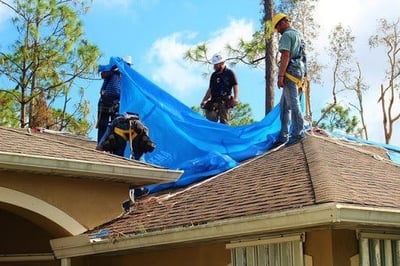
Dealing with storm damage is no time for procrastination. It requires swift action to prevent escalating problems to your home's integrity. If you're reading this, chances are you're currently battling some storm-induced roof damage and need guidance. This article is your trusty guide to understanding various types of storm damage and how to manage the repair process. So, buckle up, and let's dive in!
Understanding Storm Damage Varieties in Jacksonville
Roof damage from storms can take on various forms, largely determined by the intensity and type of Northeast Florida storm. Fortunately, most insurance companies will have your back, covering damages inflicted by Mother Nature's tantrums, be it repairs or total replacements. Starting with that pesky hail.
Hail in Jacksonville, FL: The Ice Ball Menace
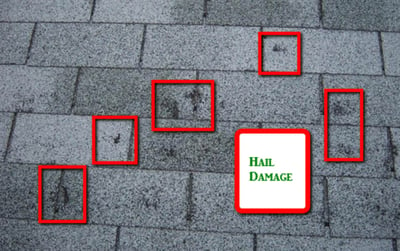
Hail is common in areas where temperatures dip low, although it can occur anywhere. Hail can be a force to be reckoned with. These chunks of ice can wreak havoc on everything around them, including your roof. After a hailstorm, inspect your roof for the following signs of damage:
- Divots and dents on shingles
- Broken or cracked shingles
- Unusual amounts of granules in the gutters
- Dented metal on the flashing and gutters
It’s important to be proactive and check for damages before they have the chance to worsen. Hail can damage the roof’s surface and make an entry point for pests and moisture, causing problems like mold and infestations, making your bad day worse within minutes.
Rain in Jacksonville, FL: A Bane to Your Roof
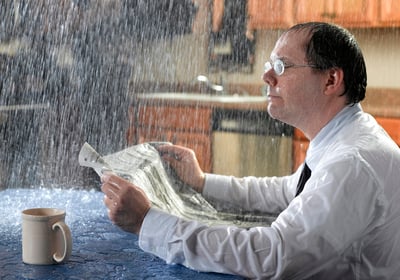
When it comes to the rain showers we get in Jacksonville, it's often more than a gentle tap dance on your rooftop. What may seem like a calming rainstorm can turn into a chaotic whirlwind causing much damage to your beloved home. In severe cases, we're talking about the kind of downpour that would give Noah's Ark a run for its money.
Here are the usual suspects you should keep an eye out for after a hefty rainfall:
- Broken, missing, or upturned shingles, looking like they've had a rough night
- Discolored or peeled paint on your ceiling, giving your interior a "vintage" look you didn't ask for
- Water bubbles in the ceiling, as if your house is trying to grow its waterbed
- Stains or suspicious puddles on your roof, which aren't a part of the decor
- Mold growth, because your home isn't meant to be a science experiment
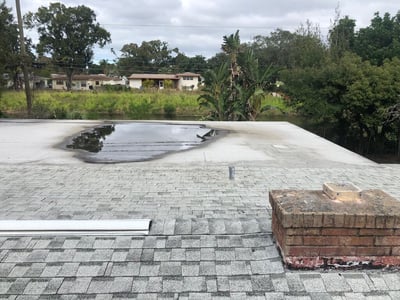
In the worst-case scenario, your roof leak might need you to impersonate a firefighter with a bucket. Even worse, if your roof was installed by a less-than-professional roofer. You may face random leaks that could make your insurance coverage as useful as a chocolate teapot. Hence, always invest in a reputable roofing contractor to help keep your long-term costs (and headaches) at bay.
Gusty Winds in Jacksonville, FL: An Underestimated Foe of Roofs
You might think heavy winds are the only type to cause damage to your roof. Yet, this is not the whole truth. Even lighter materials, such as our beloved Jacksonville classic, asphalt shingles. Well, they too can take a beating from moderate gusts.
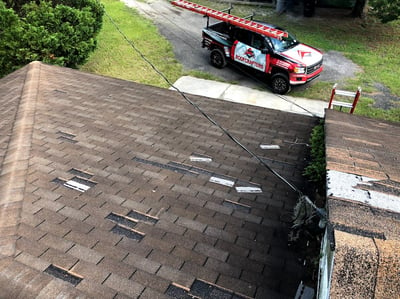
High winds don't just cause cracks and whisk away your shingles like they're conducting a grand disappearing act. The aftermath of a wind storm often leaves a myriad of hard-to-spot, yet equally troublesome issues. You may have to do some investigative work to detect creased and torn shingles, making you feel more like a detective than a homeowner.
If you spot granules from shingles congregating in your gutters or on the ground. It's probably time to put the magnifying glass down and get a professional roofer on the line for an inspection. Wind storms are notorious for leaving behind their signature marks. But don't worry, this is nothing a professional roofer armed with a sturdy ladder and a toolbelt can't fix.
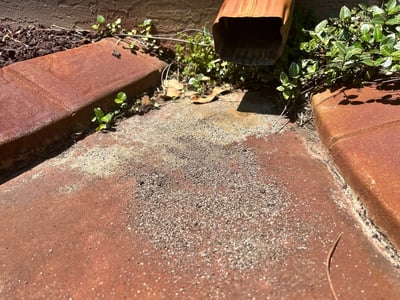
They'll handle temporary repairs to contain the damage. Providing you some peace of mind until your insurance company steps in to foot the bill for permanent fixes. But, if your property sports a metal or tile roof, the chances of a windstorm wreaking havoc are significantly diminished.
In Jacksonville, we not only have to worry about wind alone. High winds often turn trees and large branches into involuntary roof-wrecking tools. Keep an eye out for tree damage after a storm. After all, a tree is a roof's best friend until the wind starts to blow.
Addressing Storm Damage Roof Repair in Jacksonville, FL: A Step-by-Step Guide

Experiencing roof damage during a storm in Jacksonville, FL can be a frightening and bewildering experience. It's essential to remain calm and take immediate action to reduce further harm and maximize safety. The first thing to do is to switch off the power supply to prevent the risk of electrical fires in your house.
If a leak has made an unwanted appearance, move your electronics, valuable clothes, and personal items away from the water's path. Protecting your belongings from water damage can help save you money. You can avoid the sentimental loss of irreplaceable items.
Remember, safety comes first. If the situation seems dire or unsafe, ensure that you and your family evacuate your home immediately. Once the immediate crisis is under control, it's time to bring in the experts. Call up a professional roofer.
Enlisting a Professional for Severe Roof Damage Inspection in Jacksonville, FL
In the event of a storm causing massive damage to your roof in Jacksonville, FL, immediate action is critical. As soon as you've ensured everyone's safety, your next course of action should be to contact your roofing professional.
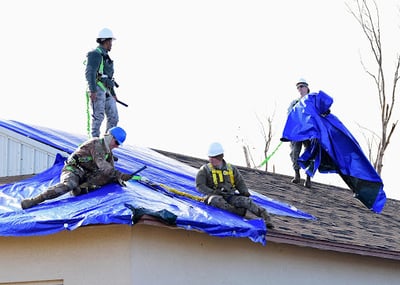
Severely damaged roofs pose a significant risk as they can potentially collapse. In such cases, a roofing expert's intervention is important. They'll have the expertise to navigate the situation safely and efficiently.
Once calling the roofing professional, it's time to get in touch with your insurance company.
Reach Out to Your Insurance Provider Following Storm Damage in Jacksonville, FL

Assuming you have been compliant with the terms of your policy. Your insurance coverage should include damages that arise from storm events. After having your roof assessed by a local roofer to confirm the damage was storm-related, reach out to your insurance company. It's essential to document the damage for insurance purposes.
To ensure you stay eligible for insurance claims, keep these crucial steps in mind:
- Choose a reliable roofer: Your insurance won't cover costs for subpar or improper roof repairs. Remember, the roof is an investment that can save you in the long run.
- Leave the work to professionals: Attempting DIY repairs or installations could lead to more damage. It could void your warranty and insurance policy.
- Maintain your roof: Doing maintenance helps identify potential issues before they escalate into costly leak repairs.
- Conduct visual inspections: A simple visual inspection of your roof can help you spot obvious issues or damage.
- Timely replacement: Roofs have a lifespan and will deteriorate over time. Most insurance companies offer limited or no coverage for roofs over 15-20 years old. Stay ahead of the curve by replacing your roof on time.
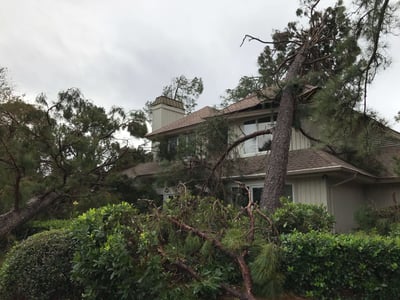
After a storm in Jacksonville, FL, especially if it involved hail or falling tree limbs. Engage a local roofing company to inspect for hidden damage. The cost of a complete roof replacement can be hefty. Keep in mind, insurance coverage doesn't cater to damages resulting from negligence, so it's always better to be safe than sorry.
Steps to Mitigate the Impact of Storm Damage on Your Roof in Jacksonville, FL
Navigating through the aftermath of a storm can be challenging. We get it, but there are steps you can take to mitigate the impact on your storm-damaged roof. Also because some insurance companies deny coverage, financing is an option. Here are the steps you can take to mitigate storm damage:
- Identify the Type of Damage: Recognize the nature of the damage your roof has sustained. As highlighted in this article, the most common forms of storm damage result from hail, rain, and wind.
- Contact a Local Jacksonville Roofing Company: Reach out to a local roofing company in Jacksonville. A roofer with experience in handling insurance claims related to storm damage. They'll be able to guide you through the repair process and work with your insurance provider.
- Schedule an Inspection: Have your contractor inspect your roof for damages. They'll help identify any damage that might not be immediately visible to you.
- Document the Damage: Take photographs of all the damages for your records and your insurance claim.
- Speak with Your Insurance Provider: Gather all the necessary documentation. Then contact your insurance provider. They'll guide the next steps in the claims process.
If you have any further questions about storm damage or insurance claims. Don't hesitate to explore the resources in our learning center or reach out to the Jacksonville RoofCrafters family. Our friendly and experienced team members are always ready to provide the help you need. We're here to help DUUUVAL!
My name is David Toth and I am the lead estimator in North Florida with RoofCrafters Roofing. Originally from New Brunswick, I have called Florida home for the past 47 years. I enjoy cooking along with traveling to different historical areas in Florida when I have free time.



